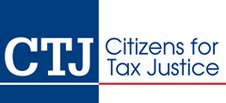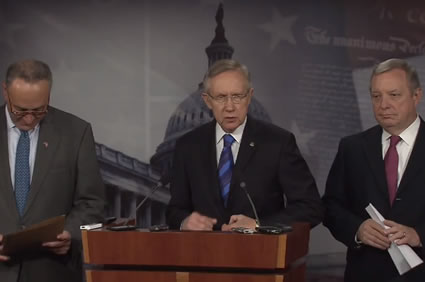 Senator Chuck Schumer of New York today said he is hesitant to support President Obama’s tax proposals because, “There are people making 250, 300 [thousand dollars] in many of our states who are not rich.”
Senator Chuck Schumer of New York today said he is hesitant to support President Obama’s tax proposals because, “There are people making 250, 300 [thousand dollars] in many of our states who are not rich.”
Actually, Citizens for Tax Justice calculated that married couples with income between $250,000 and $300,000 would get to keep 99 percent of their Bush tax cuts, on average, under the tax plan promoted by President Obama last year.
That plan, which the President continues to tout, would extend the Bush income tax cuts for the first $250,000 of income a married couple receives, or the first $200,000 of income an unmarried taxpayer receives.
This means that a married couple making $250,100 would pay higher taxes on just one-hundred dollars of income at most. President Obama’s plan would continue the tax cuts for income even beyond $250,000/$200,000 for many taxpayers once deductions and other breaks are factored in.
As a result, CTJ found that three quarters of all couples in the $250,000 to $300,000 income range would continue to enjoy all of their Bush income tax cuts if President Obama’s plan was in effect in 2011.
Another report from CTJ explains that 84 percent of the revenue savings under the President’s tax plan would come from taxpayers with incomes exceeding $1 million. The report also explains that married couples with income above $250,000 and unmarried taxpayers with income above $200,000 are the richest 2.6 percent of Americans. Even in Senator Schumer’s state of New York, only 3.5 percent of taxpayers have incomes exceeding the $250,000/$200,000 threshold. If they can’t afford to pay higher taxes, who can?
Some of the taxpayers Senator Schumer is worried about would actually pay less under President Obama’s plan. For example, a childless married couple making $250,000 in wages and taking the standard deduction in 2011 would pay $935 less in income taxes if President Obama’s plan was in effect.
See CTJ’s online tax calculator which determines how much a taxpayer would pay under the different tax proposals that were debated last year.
President Obama’s tax plan would allow the tax rates for the top two income tax brackets to revert to what they were at the end of the Clinton years. The President’s plan would also adjust the income tax brackets so that a married couple with income below $250,000 (or an unmarried taxpayer with income below $200,000) cannot possibly be affected by the top two income tax rates.
This adjustment in the tax brackets would result in a tax cut for some taxpayers, including the $935 tax cut for the married couple in the example above.
Here’s the technical explanation. There are six income tax brackets. The President’s plan pushes up the level of income you must have before you’re affected by the fifth bracket. That would mean that a portion of income that is currently taxed in the fifth income tax bracket would be taxed instead in the fourth income tax bracket, which has a lower tax rate. (Interested wonks can go to page 128 of the President’s budget blueprint that explains this arcane adjustment.)
And just in case anyone is concerned that the taxpayers described by Senator Schumer are small business people who will lay off all their employees in response to even the slightest possibility of higher tax bills, see CTJ’s report, The Bush Tax Cuts and Small Business.
 Today ITEP released three new updates of important Policy Briefs that explain timely tax topics in just two pages each. These are part of a series of Policy Briefs designed to provide a quick introduction to all the basic tax ideas that are important to understanding current policy debates:
Today ITEP released three new updates of important Policy Briefs that explain timely tax topics in just two pages each. These are part of a series of Policy Briefs designed to provide a quick introduction to all the basic tax ideas that are important to understanding current policy debates: If the following actions were taken, much of the inequity in our tax system, which is part of what’s driving the Occupy Wall Street and other affiliated protests, would be eliminated.
If the following actions were taken, much of the inequity in our tax system, which is part of what’s driving the Occupy Wall Street and other affiliated protests, would be eliminated.




 The National Priorities Project, working in partnership with Citizens for Tax Justice, has unveiled a new website that presents a running tally of the cost of the Bush tax cuts for the richest five percent, who now receive almost half of the total tax cuts.
The National Priorities Project, working in partnership with Citizens for Tax Justice, has unveiled a new website that presents a running tally of the cost of the Bush tax cuts for the richest five percent, who now receive almost half of the total tax cuts.

 to look, with increasing urgency, for additional revenue-raising opportunities outside of the income, sales and property taxes that form the backbone of most state tax systems. One of the most popular alternatives to those major revenue sources is state-sponsored gambling. But gambling revenues are rarely as lucrative, or as long-lasting, as supporters claim.
to look, with increasing urgency, for additional revenue-raising opportunities outside of the income, sales and property taxes that form the backbone of most state tax systems. One of the most popular alternatives to those major revenue sources is state-sponsored gambling. But gambling revenues are rarely as lucrative, or as long-lasting, as supporters claim. Governor Haslam is absolutely right in saying that “this isn’t a new tax; this tax was already due. This was just a question of Amazon collecting it themselves.” Tennessee residents have always been required to pay tax on purchases made over the Internet, but that law is essentially unenforceable without the cooperation of retailers.
Governor Haslam is absolutely right in saying that “this isn’t a new tax; this tax was already due. This was just a question of Amazon collecting it themselves.” Tennessee residents have always been required to pay tax on purchases made over the Internet, but that law is essentially unenforceable without the cooperation of retailers. similar to a plan Mayor Rahm Emanuel proposed earlier this year. It was quickly dubbed the “
similar to a plan Mayor Rahm Emanuel proposed earlier this year. It was quickly dubbed the “ Only one-fifth of one percent of U.S. taxpayers would pay the surcharge proposed by Senate Majority Leader Harry Reid to offset the costs of President Obama’s jobs bill. These figures show that in the majority of states only one-tenth of a percent of taxpayers would pay the surcharge in 2013. Only in one state would the share of taxpayers paying the surcharge exceed one percent.
Only one-fifth of one percent of U.S. taxpayers would pay the surcharge proposed by Senate Majority Leader Harry Reid to offset the costs of President Obama’s jobs bill. These figures show that in the majority of states only one-tenth of a percent of taxpayers would pay the surcharge in 2013. Only in one state would the share of taxpayers paying the surcharge exceed one percent. Senator Chuck Schumer of New York today
Senator Chuck Schumer of New York today  show star Snooki of “Jersey Shore” has found herself at the center of two important tax policy debates. The first was last year when Snooki criticized President Barack Obama for the
show star Snooki of “Jersey Shore” has found herself at the center of two important tax policy debates. The first was last year when Snooki criticized President Barack Obama for the